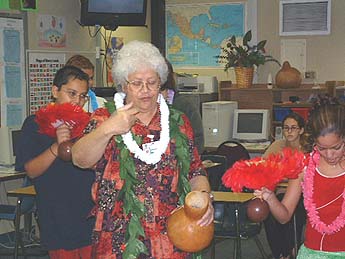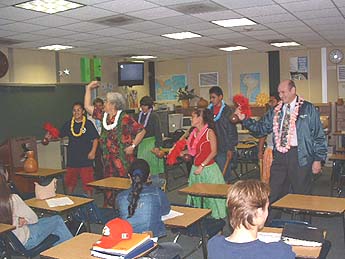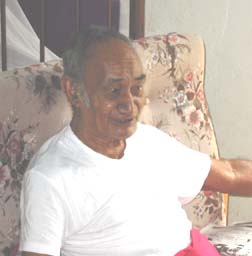|
| From Patricia Beondé in Stuart, Florida (29 February 2004) I am writing to let you know how
much my ESOL students, at Martin County High
School, and I enjoyed a presentation by BYU Hawai'i
alumna, Tiva (Ieli) Sievinen (1963-68). Tiva,
originally from Rotuma, Fiji Islands, had acquired
a repertoire of knowledge and skills learned
as a dancer and tour guide at the Polynesian
Cultural Center.
From the Executive Director, Rotuma Investments Ltd in Suva (28 February 2004) The following is an update on the progress so far concerning the office complex, which the Company had planned to build at the government station in Ahau to accommodate all the government ministries/departments stationed on the island. This project will cost about $1.6 million. All the necessary building plans, drawings, and related works have been completed and the Board of Directors of the Company have also received approval for its application for funds from its financiers. However, there is a slight delay due to the lease documents, which have yet to be formally cleared by Government. This should be finalized within the next week or so. The construction of the complex will be carried out by a contractor and it is estimated that the complex will be completed in about six months. Government will occupy the whole complex and the rent proceeds will be used to pay towards the loan and finance other services or development works on the island. The Board will endeavor to keep the Rotuman community informed on a regular basis of the activities and other developments within the Company. From the New Zealand Herald (22 February 2004, posted 2 March)) Sofia Tekela-Smith is participating in an exhibition of New Zealand art in New York. The exhibition at the Asia Society Gallery is entitled "Paradise Now? Contemporary Art from the Pacific." It opened on 21 February and will run until 9 May. It is the largest exhibition of New Zealand art in New York in a decade. Sofia Tekela-Smith exhibited two photographs of her body ornaments with images of a man's face, one his mouth filled with a large cowrie shell amulet and the other with it filled with a greenstone one. The face is that of her partner, John Pule, and alludes to his dual cultural backgrounds and the cultural crossovers that occur in much of the Pacific. Update from Rejieli Paulo in London (16 February 2004) The Shepherd-Paulo family will be moving to London in September! I received a call this morning at 10:30 am from the Director of the National Opera Studio to inform me that I had been offered a place for 2004/05. I can't believe it! Thank all of you who have prayed for me and for your well wishes. The positive vibes have paid off. From Rejieli Paulo in London (12 February 2004) I have been having regular lessons
with Raymond Connell, absolutely magic! The sound
he was getting me to produce was very exciting,
I just wish I had more time with him. I was fortunate
to be invited to "Opera scenes" with
4th and 5th year students at the Royal College
and was extremely impressed at the quality of
their performances, in particular some very exciting
singing. From Alan Howard in Honolulu (8 February 2004) It was with great sadness that we learned of the death from emphysema of Aisea Aitu at Ahau on Tuesday, 3 February, just three weeks after his wife, Katarina, passed away. Aisea was a personal friend and someone for whom both Jan and I had great respect and admiration.
Aisea was born to Jimione Nakaora from Pehaua and Ritie Garagsau from Else'e in Malhaha in March 1930. He was the youngest of four children. He went to Malhaha Primary School where, at the age of eleven, he was asked to teach Class 3 when one of the teachers left to join the military in Fiji. His pay was 12 shillings a month. In 1944 he went to Fiji where he attended Lelean Memorial School at Davilevu. He later attended teachers training school at Nasinu, and was then appointed to Queen Victoria School as an assistant master. He taught three years there before receiving a scholarship to a training college in New Zealand, where he studied for one year in a general training program and for another year in a university course directed by the University of Auckland. In 1957 Aisea was appointed to Rotuma. He arrived there toward the end of February 1958, when the secondary school at Malhaha was initiated. He was appointed to teach Form III. He was elected Malhaha's representative to the Rotuma Council that same year and later served as Rotuma's senator to the Fiji Legislature. In 1960 I interviewed Aisea concerning his life experiences and views on various topics. In response to a question concerning leadership he gave the following response:
Aisea Aitu was indeed a leader. And as a teacher of many of Rotuma's most successful sons and daughters, his influence will resound through the ages. He is survived by his children: Ieli Pene, Makereta Steele, Tue Aitu, Harieta Erasito, Yvonne SuniaMafileo, Walter Aitu, and Pierre Aitu, all of whom would like to thank the Malhaha kaugaruaga who helped out during his final illness. From Steve Walker in Sydney, Australia (8 February 2004) Today the Drummoyne Rotuman congregation welcomed the Reverend Peter Hoe-Seung Chung as their new minister during an induction service organized by the Presbytery of Sydney. Rev Chung was ordained in December 2003 and appointed as the Uniting Church in Australia minister for the Five Dock Drummoyne and Drummoyne Rotuman Congregations from 1 February 2004. Rev Chung was born in 1971 and completed a bachelor of engineering degree in Korea in 1994. He previously worked in production planning for a confectionary company, then went to New Zealand to study theology at Bible College of New Zealand from which he received a diploma in 1998. He came to Australia to continue his studies, joining the Sydney Korean Community Church (Lindfield UCA). Candidated in 2000, he completed a Bachelor of Theology in 2002 and will finish a Master of Theology degree in 2004. During his studies he had field placements at Wentworthville and West Epping, and completed an urban CPE (Clinical Pastoral Education) course this year. Rev Chung rates his strengths in the areas of preaching and leadership of worship, relating to young people, developing multicultural understandings, and nurturing people in their faith and spiritual development. He plays the guitar, loves singing, and enjoys the musical co-operation and support of his wife, Katherine. They are both members of the Sydney Hosanna Praise and Worship Band. They have two children: Ashleigh (born in 2001), and Anna (born in 2003). From Pam Nataniela in Suva (4 February 2004) There have been some serious Telecom
problems on Rotuma recently. Apparently some
lightening struck, damaged equipment, and Rotuma's
phones were down for about a week. They managed
to get just two lines working, so if anyone is
trying to call Rotuma and gets a busy tone, it
is more likely that the lines are being used
rather than the number you are calling is busy.
You may have to keep redialing until you can
get through. Telecom is working on the problem.
The irony is that Air Fiji off-loaded cargo for
the past couple of flights--including Telecom
equipment. Also, mail is frequently off-loaded,
so for those of you who fret because you don't
hear back from Rotuma in a reasonable amount
of time, it may be either because they didn't
received your letter in as short of a time as
you are used to, or because the outbound mail
was off-loaded in Rotuma! From Fijilive (3 February 2004) Taito replaces Leweni as military mouthpiece Former army spokesman Captain Ned Taito resumes his position as military spokesman following the transfer of Neumi Leweni to the institution’s music section. Taito recently returned from a tour of duty in East Timor where he was assigned to the UN Headquarters as public information officer. Leweni takes up his appointment as acting director of music. He had earlier served for 20 years with the Republic of Fiji Military Forces band. |


